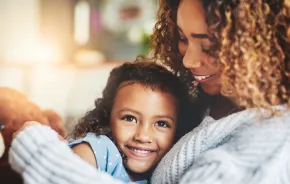 One mid-August afternoon, as I pondered the daily “too hot to cook” dilemma in the kitchen, the strains of an unfamiliar teenybopper tune drifted down the hallway. I investigated. My 6-year-old daughter’s friend had pulled up Hannah Montana on Netflix, and Miley Cyrus was now streaming into my living room in all her preteen glory.
One mid-August afternoon, as I pondered the daily “too hot to cook” dilemma in the kitchen, the strains of an unfamiliar teenybopper tune drifted down the hallway. I investigated. My 6-year-old daughter’s friend had pulled up Hannah Montana on Netflix, and Miley Cyrus was now streaming into my living room in all her preteen glory.
“Is this OK?” asked my daughter, with a pleading expression. Was it? I’m picky about television programs, but this one seemed fairly tame. The plot centered around a strong father-daughter bond, and the characters’ clothing and language seemed appropriate. I agreed that they could watch the show occasionally, as long as I was in the room.
Fast-forward two weeks. Miley’s raunchy onstage antics at the 2013 Video Music Awards made it clear that she wasn’t interested in being a role model to young girls — at least, not the sort I wanted for mine.
I swiftly put the kibosh on their budding relationship with Hannah Montana. The decision was met with some wheedling (especially from the friend who’d introduced the girls to Hannah in the first place), but I held firm. The images of Miley “twerking” (don’t ask) were all I needed to see to ban her franchise from our home.
Did I overreact to the media hoopla around Miley’s performance? Not according to researchers. Statistics show that celebs hold plenty of sway over impressionable young children. A 2006 study by USA Weekend found that half of teens agree that peers are more likely to smoke or drink because they see celebrities do it. Over three-quarters of teens think that their peers are likely to diet after a star loses weight, and some 60 percent say peers want to copy a celebrity’s tattoos and piercings.
The USA Weekend survey found that 13 percent of teens had dieted to make themselves look more like a celebrity. In another exploration, tweens cited pop singers as a top influence on their clothing choices.
Pop culture does more than glamorize damaging behaviors like drinking and smoking for kids and young adults — it can also distort their worldview. Research from the University of Calgary found that 60 percent of college students admitted a celebrity had influenced their beliefs, attitudes and personal values.
The skewed view of the adult world is what bothers Heidi North, a Lake Tapps mom of two boys, ages 5 and 8. “One of our most important jobs as parents is to keep our children grounded in reality. There’s a big disconnect between how life is presented in television and movies, and how it truly is,” she says. Picture-perfect teenage celebrities who live in lavish homes and have piles of cash — no real jobs, financial problems or nagging parents — don’t exactly give children realistic expectations about the future.
Little copycats
So celebrity influence is a problem for tweens and teens, but parents don’t need to worry about it during the Sesame Street years, right? Wrong: Modeling begins much earlier than parents think, says parenting educator and mom of five Vicki Hoefle, author of Duct Tape Parenting. “Children start to emulate others as early as age 2. Little girls want to play in mom’s makeup bag, and little boys start carrying around a hammer.”
A little later on, during elementary school, children begin to look beyond their parents as the inspiration for their identity. “There is a moment when a child makes a connection with a certain type of person. Suddenly they want to know more about that person, and they want to look like and dress like him or her,” says Hoefle. The influential “celebrity” could be a ballerina in a story, an accomplished athlete or a young, hip teacher. For my girls, it’s their stylish aunt, who inspires them to contort nearly all of their shirts into halter tops.
Being enthralled with appealing adults — both real-life adults and characters in books and movies — is a normal, healthy part of learning about the world. (Phew, so I can quit worrying about my 6-year-old’s keen interest in sporting what she calls “a Rapunzel braid.”) It’s when kids continue their celeb exploration without parental guidance that things get murky, Hoefle says.
Left to their own devices, kids won’t always choose appropriate role models. When it comes to selecting celebrity idols, “kids follow their instincts,” she says. “Then, suddenly, we see an adolescent who is really looking to identify themselves, and it seems very easy to just grab somebody else’s identity and put it on.”
Rethinking media bans
Ready to lock down the television set? Not so fast. Kids who don’t watch television or listen to popular music aren’t necessarily protected from negative influence. In fact, sheltering kids from modern media in an effort to avoid the latest pop princess and bad-boy athlete can backfire.
“Preparing kids to navigate the world they are going to live in is a safer bet than sheltering,” says Hoefle. “Eventually kids will encounter the thing you’ve hidden from them, and they’ll have no clue how to interpret what they’re seeing or hearing.”
When children without any media savvy become teens and media consumers, they may not be able to view the world with the critical thinking necessary to make sound judgments and resist negative influences. “As they enter the traffic flow of life, everyone else is in fifth gear, while they’re in first,” says Hoefle.
For most families, it’s simply not possible to keep kids completely in the dark about popular culture; less than-wholesome programming, images and phrases have a way of sneaking past the most vigilant media-monitoring moms and dads. Pop music, with oversexualized starlets and questionable lyrics, is particularly ubiquitous. Because the latest catchy tunes follow children nearly everywhere, via car stereos, iPods and overhead speakers at the mall, songs are harder to block than TV shows, and suggestive, materialistic or violence-glorifying messages can find kids more often than parents like.
Kimberly Puhrmann of Duvall doesn’t let her 7-year-old daughter Hallie listen to top-40 music. But Hallie’s peers are more than happy to share the latest songs and catchphrases. Hallie came home from school singing, “Hey, sexy lady . . .” at the height of last year’s “Gangnam Style” craze popularized by rapper Psy’s catchy song and infectious dance moves.
“We had to talk about ‘adult language,’ and tell her that ‘sexy’ isn’t an appropriate word for her to say,” says Puhrmann. They struck a compromise: Hallie could sing the tune as long as she subbed the word “awesome” for “sexy.”
Sammamish mom of three Lisa Sanford doesn’t allow her children, ages 6 to 11, to idolize celebrities or musicians like Kid Rock, who embrace a drugs-and-booze lifestyle. But it’s still tough to know where to draw the line when it comes to musicians and their ever-changing images.
“I struggle with allowing my children to purchase songs on iTunes if I find the artist to be a bad role model,” says Sanford. She’s not a fan of Katy Perry’s racy image, but when her 11-year-old wanted to download the song “Firework,” she said yes, because the song seemed fairly tame. “Now I cringe every time I see the album cover pop up on the iPod. It does seem overly sexualized to me, at least for teens.”
Parent-guided programming
Megan Temple, an Olympia mom of three, takes a balanced approach to TV role models. “My husband and I both have backgrounds in television production, so we feel like television viewership is just a part of our lives. But that doesn’t mean we have to throw our kids to the wolves,” she says.
Allison and Emily Temple, 8 and 5 respectively, watch Good Luck Charlie and admire one of its stars, actress and singer Bridgit Mendler. They recently saw her live in concert, and went home sporting T-shirts emblazoned with Mendler’s face. Currently, Mendler seems to be the epitome of a wholesome, all-American teen. Temple is aware that the image may not last, but she’s prepared. “I think it would be a great opportunity to talk to my daughters about the importance of integrity and making good life choices,” she says.
It’s a safe bet that many celeb idols will eventually be dethroned, says Hoefle. “Parents should be realistic. It’s likely that something will happen.” And that could actually be a good thing: celeb slipups are a chance for tweens and teens to see negative behaviors and their consequences from a safe distance.
“This is how you use celebrities as a positive influence, regardless of the celebrity’s actions — you talk to your kids about what they’re seeing,” says Hoefle.
Power plays
The best way to help a child resist celebrity influence is to encourage them to be an active participant in their own life, says Hoefle. Kids with a strong sense of their own identity won’t be as likely to impersonate celebs. Encourage kids to develop their own style: Allow them from a young age to participate in choosing their own clothing, hairstyle and bedroom décor.
Don’t freak if your teen admires a tattooed celeb and wants a tattoo of his or her own. “That’s the time to sit down and say, ‘Walk me through this. Convince me that you’re responsible enough to make this choice,’” says Hoefle.
If the answer is “not yet,” help teens see how they can earn more trust and responsibility at home. Making a parental power play, such as an outright ban on any and all ink, can alienate teens and give the influential celebrity more sway.
Teens want power, and they are looking for ways to differentiate from their parents, says Seattle-based family therapist Caroline Plummer. “Parents need to allow teens to increase their power and decision making in a safe way.”
“I can’t stress enough the importance of finding real-world ‘celebrities’ for kids to idolize,” says Hoefle. Spending time with families with girls or boys a few years older than your daughter or son helps build healthy role-model relationships that don’t involve a screen or the airbrushed excesses of Hollywood.
“Find other parents you respect and tell them you want your kids to be in the company of older kids who can help them learn,” she says.
That I can do. I’m already on the lookout for potential older friends with role-model potential (prerequisite: must like sparkles). With luck, it will be a while before the next pop star du jour makes her way into my home, and my girls’ hearts. But when it does happen, I’ll be prepared.
Malia Jacobson is a nationally published parenting journalist and mom of three.
HELPING KIDS RESIST CELEBRITY PRESSURE
- Find a healthy tribe for your kids.
- Give kids healthy, real-world role models by connecting with like-minded parents of children a few years older than yours.
- Expect celeb slipups.
- The reality is that many pop stars will make public mistakes. Use them as opportunities to discuss decision making and personal values.
- Reinforce your values.
- When watching television or movies or listening to music with kids, point out the messages that align with values you want your kids to learn.
- Allow healthy decision making.
- Kids will be more likely to resist celebrity influence if they have a strong sense of self. Allow them to create their own look and identity by choosing their own clothing, hairstyle and accessories whenever possible.
Source: Vicki Hoefle, author of Duct Tape Parenting











